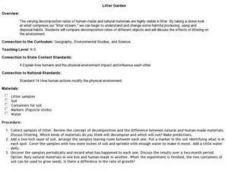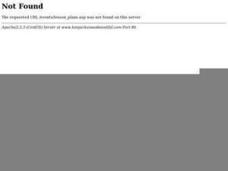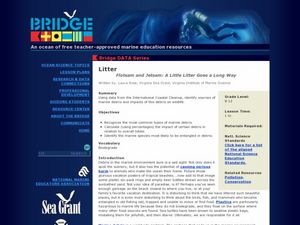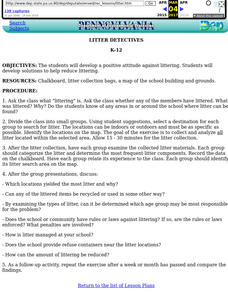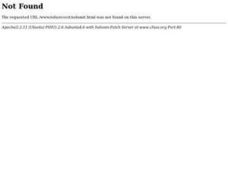Curated OER
Litter From Lunchtime
Students explore environmental care by participating in a litter identification activity. In this food trash lesson plan, students discuss the destruction litter causes in our environment and ways we can avoid littering ourselves....
Curated OER
Recognizing Litter
When does trash become litter? Use this litter awareness lesson to help them understand the importance of trash disposal. Get learners engaged by reading Nancy Loewen's Lady Lulu Liked to Litter (not included). After discussing what...
Chicago Botanic Garden
Leaf Litter Ecology Lab
Some organisms spend their entire lives in leaf litter. The third in a series of six is a great lesson exploring the community of leaf litter. Groups gather and then spread leaf litter over white paper and remove leaves/twigs while...
Curated OER
Litter Bugs
Young scholars read the book The Warville Wizard about litter, identify litter around their homes and school, and come up with solutions to the litter problem. In this litter lesson plan, students discuss how to be proactive and not litter.
Curated OER
Pick Up a Litter Bit-Earth Day
Students investigate the effects of litter on the environment. In this environmental activity, students read the statistics on pollution and identify the effects it has on the Earth. Students develop a plan to clean up their local...
Curated OER
Litter Patrol
Students collect litter. In this recycling lesson, students review the term litter and give examples. Students collect litter at their school. They separate the litter into different categories and discuss if these materials could be...
Curated OER
Litter
Students discuss the concept of littering and what they do personally to contribute or prevent littering. In this environmental awareness lesson, students create a jingle, or a commercial to promote recycling. Links to some excellent...
Curated OER
Layers of the Forest- Leaf Litter
Students conduct an experiment. In this temperate forest instructional activity, students discuss what kind of animal life can be found in the forest. They read The Magic School Bus Meets the Rot Squad: A Book About Decomposition and...
Curated OER
Litter Recognition
Students identify litter, and discuss what to do with it. They analyze people's response to litter. Some people may ignore it, while others may pick it up. They observe student behavior as part of an experiment.
Curated OER
Recycling Litter - Reduce Reuse Recycle Lesson Plan
Student create their own ways to help the environment. In this recycling lesson, students explore how to identify many different types of waste materials, know what types of waste materials can be reduced, reused, and recycled, and...
Curated OER
Litter Garden
Students discuss what man-made and natural materials are visible in litter. Using a sample of litter, they review the concept of decomposition between the two types of materials. They examine the two samples once and a while and record...
K12 Reader
Coyote: The Survivor of North America
Coyotes in Chicago? Yip. Middle schoolers demonstrate their ability to identify details that support the idea that coyotes are adaptable creatures.
K12 Reader
David Copperfield
High schoolers use the provided graphic organizer to demonstrate their ability to identify the main idea and supporting ideas in a passage from Charles Dickens' David Copperfield.
Curated OER
"Litter Literature"
Students investigate the effects of littering. They read and discuss the story, 'The Wartville Wizard,' identify the characters and answer discussion questions, and role-play scenarios from the book.
Curated OER
The Lorax and Forest Park
Students read The Lorax by Dr. Seuss and identify situations where there is a risk to the community. During a class discussion, students predict types of liter they will find in a park. Students take a field trip to the park to collect...
Curated OER
It's a Wrap!
Students read about the importance of packaging foods and related items properly and reducing waste. In this packaging lesson, students read the background information about packaging and bring a variety of packaging materials to class....
Curated OER
LitterFlotsam and Jetsam: A Little Litter Goes a Long Way
Students explore the concept of environmental stewardship. In this science lesson, students investigate data from the International Coastal Cleanup, identify sources of marine debris, and discover the impacts of this debris on wildlife.
Curated OER
Pharaoh Mountain Hike: Investigating Adirondack Life Zones
Students hike a local mountain and examine its life zones. They measure various components at each zone and collect leaf litter at the sites. At the mountain top, students make descriptive observations and complete a handout about the...
Curated OER
Rubber Duckies and Ocean Currents
Students explore marine life by conducting a rubber duck experiment. In this water currents lesson plan, students practice identifying latitude and longitude coordinates on a map and define the currents of major oceans. Students discuss...
Curated OER
Talking Trash - Marine Debris
Students bring in different trash items and define "marine debris" through a discussion about these items. They categorize debris and use statistics and graphing to better explain the types and amounts of marine debris found each yea
Curated OER
Litter Detectives
Students develop a positive attitude against littering by creating solutions to help reduce littering.
Curated OER
Tides in the Hudson
Students view an illustration of the Hudson River watershed and identify the bodies of water shown. They discuss what happens when fresh and salt water mix. Students view a teacher demonstration of the stratification of fresh and salt...
Curated OER
It's Not Easy Being Green
Pupils complete a unit that focuses on their school's waste production. They conduct a litter survey, collect the waste produced in their classroom for a week and generate a waste-audit, and identify how their school can minimize waste...
Curated OER
Where Does Al the Waste Go?
Students construct a sanitary mini-landfill and an open mini-dump. Over a thirty day period, they compare the two methods and determine landfills are envorinmentally safer. They observe a demonstration of burning waste. They create...












